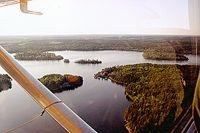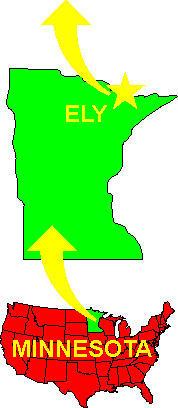About the Boundary Waters Canoe Wildernes Area (BWCA)


Northern Minnesota is truly canoe country! If you enjoy a little physical exertion and the unique feeling of dipping your paddle into the water to propel your canoe, then wilderness canoeing just might be for you.
The combination of Minnesota's Boundary Waters Canoe Area and Ontario, Canada's Quetico Park forms one of the world's great wilderness areas; the largest international area set aside for wilderness recreational purposes in the world. For thousands of years, the area has served as a travel corridor for native peoples and, more recently, as one of the main routes to the west for European explorers and fur traders. The so-called Voyageurs' Highway ran through what is now the BWCA and Quetico Park. Today its quiet waters and non-mechanized mode of travel serve as a haven from the pressures of modern-day living.
Boundary Waters (BWCA)
The Boundary Waters Canoe Area Wilderness - BWCA, protected as a true American wilderness, has changed little since the glaciers melted. Canoeing, and fishing opportunities are nearly endless on the more than 2,000 lakes and streams found within the forest. With 1,500 miles of canoe routes, nearly 2,200 designated campsites, and more than 1,000 lakes and streams waiting, the BWCA boast some of the country's finest fishing for walleye, northern pike, and smallmouth bass.
The Boundary Waters Canoe Area Wilderness is part of the National Wilderness Preservation System. It is managed by the United States Forest Service. North Country, under contractual agreement as a "Cooperator", works with the Kawishiwi Ranger District, on the Superior National Forest. We also hold Guide/Packer Agreements, as well as Towboat / Van Agreements, with the Forest Service.
Quetico Provincial Park
Quetico Provincial Park, in Ontario, makes up the northern half of this international canoe country. At 1.2 million acres, Quetico Park is also Ontario's second largest wilderness park. Routes here differ slightly from the U.S. side (not better and not worse). Portages and campsites are a little more rugged because the park does not have portage crews managing the area as is done in the BWCA. With few exceptions, whatever can be found on one side of the border, can usually be found on the other: wildlife, fishing, and both isolated solitude as well as busy areas. The biggest difference is the nightly, per person, camping fee charges to visitors of Quetico Park North Country is one of only two Ely outfitters to have been granted the ridged Outfitter / Guiding License by Manitoba.
More BWCA information
- Weather in the BWCA
- The Ultimate in Eco-travel: Wilderness Canoe Trips
- Tips on BWCA Routes
- Tips on Entries to the BWCA
- Fishing the BWCA
- Human History of the BWCA
- BWCA Wildlife and Plants
- BWCA Rules, Regulations & Fees
- Quetico Rules, Regulations & Fees
